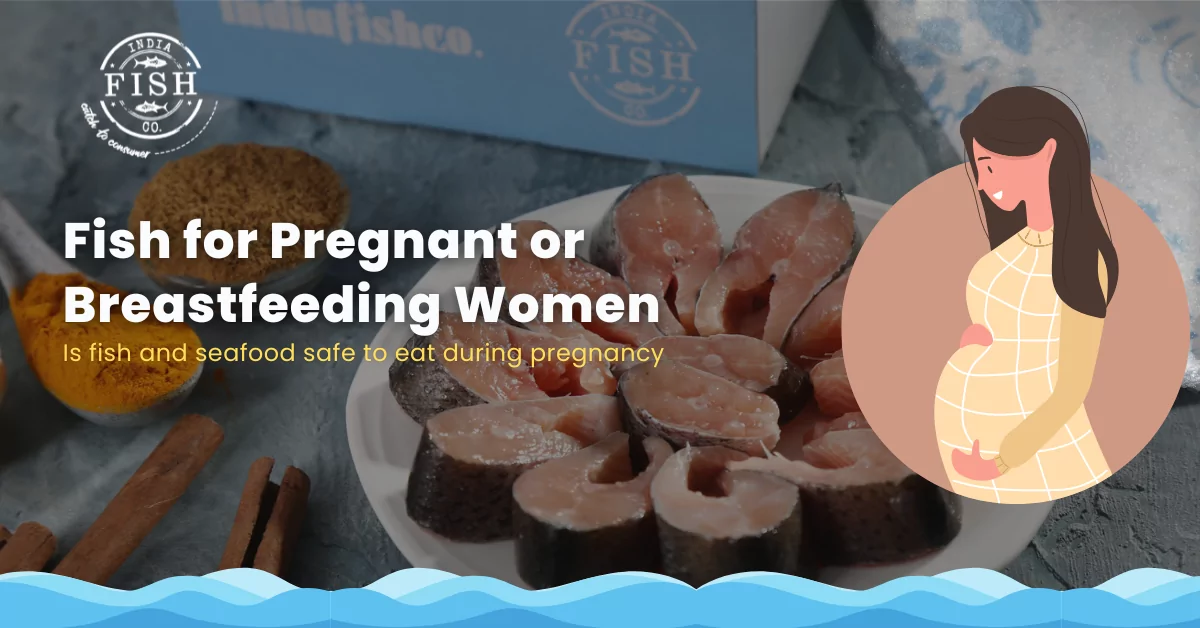The omega-3 fatty acids in various fishes can endorse your baby’s brain development. Some data shows that eating an adequate amount of seafood during pregnancy also helps prevent preterm birth and leads to developmental profits and higher IQ. But similarly, on other hand, you should avoid mercury that is present in fish.
Given below are the fishes which are recommended for Pregnant or Breastfeeding Women, who require less Mercury and High Omega-3 fatty acids in their diet,
- Sardines / Mathi
- Anchovy / Nethili
- Salmon / Rawas
- Shrimp / White Prawns
- Pollock
- Catfish / Pangash / Basa Fillets
- Sole Fish
- Tilapia
- whitefish
- Small Dried Fish
To be Avoided, say no to
- Shark / Sura
- Swordfish
- King Mackerel / Seer Fish / Surmai
- Tuna / Surai / Soora /Chura
- Uncooked / Half-cooked fish and shellfish
- Any Large Fish – long-living ones accumulate more mercury
Pregnancy and fish: Is fish and seafood safe to eat during pregnancy?
If you are not sure about whether it’s safe to eat fish/seafood during your pregnancy, you’re not alone. Recognize the guidelines for pregnancy and fish.
Pregnancy nutrition might be confusing, especially when the turn comes to seafood. Here is the guideline, to help understand the facts.
What are the profits and constraints of eating seafood during pregnancy?
Seafood, which includes fish and shellfish, could be a great source of protein, iron, and zinc. That are vital nutrients for your child’s growth and development. The omega-3 fatty acids present in many fishes, including docosahexaenoic acid (DHA), also can promote your child’s brain development.
While some kinds of seafood particularly large, greedy fish such as shark swordfish, king mackerel, and, tilefish can contain high levels of mercury. Though the mercury that is present in seafood is not a worry for most adults, special precautions are to be applied for pregnant women or planning to become pregnant. If you regularly eat high-mercury fish, the substance can accumulate in your bloodstream over time. Too much mercury substance in your bloodstream could damage your child’s developing brain and nervous system.
How much seafood is recommended for pregnant women?
The Food and Drug Administration (FDA), the Environmental Protection Agency (EPA), and the 2015-2020 Dietary Guidelines for Americans recommend that pregnant women can eat at least 8 ounces and up to 12 ounces (340 grams) in a week, of a variation of seafood that contain less amount of mercury. That’s about two to three servings.
What’s safe to eat?
You can eat a variety of seafood or fish that are low in mercury and high in omega-3 fatty acids, such as:
- Salmon
- Anchovies
- Herring
- Sardines
- Freshwater trout
- Pacific mackerel
Other safe choices include:
- Shrimp
- Tilapia
- Cod
- Catfish
- Canned light tuna
However, limit white (albacore) tuna and tuna steaks to 6 ounces (170 grams) a week.
Are there any other guidelines regarding the consumption of seafood during pregnancy?
You may consider the below-prescribed precautions:
- Avoid large, greedy fish. To reduce your exposure to mercury, avoid consuming swordfish, king mackerel, or tilefish.
- Skip uncooked fish and shellfish. To avoid injurious bacteria or viruses, avoid eating uncooked fish and shellfish, including oysters, sushi, sashimi, and refrigerated uncooked, smoked or jerky seafood.
- Understand local fish advisories. If you eat fish from local waters, need to pay high attention to local advisories. If advice isn’t available, avoid or reduce eating fish from local waters to 6 ounces (170 grams) a week.
- Cook seafood properly. Maximum seafood would be cooked to an internal temperature of 145° F (63°C). Fish preparation is done when it splits into flakes and appears opaque throughout. Cook shrimp and lobster till their flesh is pearly and opaque. Carefully cook clams, mussels, and oysters until their shells are open. Discard any that do not open.
Keep in mind that researchers haven’t yet determined whether supplements can promote fetal brain development. While pregnant women can get omega-3 fatty acids from many sources, most experts recommend eating seafood/fish for this purpose.
Though high mercury substances can harm a developing baby’s brain, yet eating average amounts of seafood containing low levels of mercury during pregnancy has not been shown to cause problems. And the omega-3 fatty acids in many types of fish can boost your baby’s healthy cognitive development. As long as you avoid fish known to be high in mercury or contaminated with pollutants, seafood can be a regular part of your healthy-eating plan during pregnancy.
Boost your health with us. Order online fresh fish of your choice today at https://indiafishcompany.com/


